 Libri di Giorgio Agamben su Unilibro.it
)
Libri di Giorgio Agamben su Unilibro.it
)
|
|
2009 |
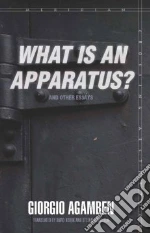 Title :
What Is an Apparatus? and Other Essays
Title :
What Is an Apparatus? and Other EssaysAuthor: Agamben Giorgio, Kishik David (TRN), Pedatella Stefan (TRN) Publisher: Stanford Univ Pr The three essays collected in this book offer a succinct introduction to Agamben's recent work through an investigation of Foucault's notion of the apparatus, a meditation on the intimate link of philosophy to friendship, and a reflection on contemporariness, or the singular relation one may have to one's own time. "Apparatus" (dispositif in French) is at once a most ubiquitous and nebulous concept in Foucault's later thought. In a text bearing the same name ("What is a dispositif?") Deleuze managed to contribute its mystification, but Agamben's leading essay illuminates the notion: "I will call an apparatus," he writes, "literally anything that has in some way the capacity to capture, orient, determine, intercept, model, control, or secure the gestures, behaviors, opinions, or discourses of living beings." Seen from this perspective, Agamben's work, like Foucault's, may be described as the identification and investigation of apparatuses, together with incessant attempts to find new ways to dismantle them. Though philosophy contains the notion of philos, or friend, in its very name, philosophers tend to be very skeptical about friendship. In his second essay, Agamben tries to dispel this skepticism by showing that at the heart of friendship and philosophy, but also at the core of politics, lies the same experience: the shared sensation of being. Guided by the question, "What does it mean to be contemporary?" Agamben begins the third essay with a reading of Nietzsche's philosophy and Mandelstam's poetry, proceeding from these to an exploration of such diverse fields as fashion, neurophysiology, messianism and astrophysics. € 63,80
|
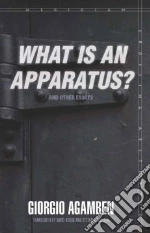 Title :
What Is an Apparatus? and Other Essays
Title :
What Is an Apparatus? and Other EssaysAuthor: Agamben Giorgio, Kishik David (TRN), Pedatella Stefan (TRN) Publisher: Stanford Univ Pr The three essays collected in this book offer a succinct introduction to Agamben's recent work through an investigation of Foucault's notion of the apparatus, a meditation on the intimate link of philosophy to friendship, and a reflection on contemporariness, or the singular relation one may have to one's own time. "Apparatus" (dispositif in French) is at once a most ubiquitous and nebulous concept in Foucault's later thought. In a text bearing the same name ("What is a dispositif?") Deleuze managed to contribute its mystification, but Agamben's leading essay illuminates the notion: "I will call an apparatus," he writes, "literally anything that has in some way the capacity to capture, orient, determine, intercept, model, control, or secure the gestures, behaviors, opinions, or discourses of living beings." Seen from this perspective, Agamben's work, like Foucault's, may be described as the identification and investigation of apparatuses, together with incessant attempts to find new ways to dismantle them. Though philosophy contains the notion of philos, or friend, in its very name, philosophers tend to be very skeptical about friendship. In his second essay, Agamben tries to dispel this skepticism by showing that at the heart of friendship and philosophy, but also at the core of politics, lies the same experience: the shared sensation of being. Guided by the question, "What does it mean to be contemporary?" Agamben begins the third essay with a reading of Nietzsche's philosophy and Mandelstam's poetry, proceeding from these to an exploration of such diverse fields as fashion, neurophysiology, messianism and astrophysics. € 16,80
|
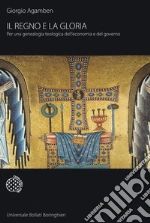 Title :
Il regno e la gloria. Per una genealogia teologica dell'economia e del governo. Homo sacer
Title :
Il regno e la gloria. Per una genealogia teologica dell'economia e del governo. Homo sacerAuthor: Agamben Giorgio Publisher: Bollati Boringhieri "Dalla teologia cristiana derivano due paradigmi politici in senso lato, antinomici ma funzionalmente connessi: la teologia politica, che fonda nell'unico Dio la trascendenza del potere sovrano, e la teologia economica, che sostituisce a questa l'idea di una "oikonomia" concepita come un ordine immanente - domestico e non politico in senso stretto - tanto della vita divina quanto di quella umana. Dal primo, derivano la filosofia politica e la teoria moderna della sovranità; dal secondo, la biopolitica moderna fino all'attuale trionfo dell'economia e del governo su ogni altro aspetto della vita sociale". Con quest'opera, qui riproposta con un inedito apparato iconografico, l'indagine sulla genealogia del potere iniziata da Agamben con "Homo sacer" giunge a uno snodo decisivo. Il potere moderno - mostra Agamben non è soltanto "governo", ma anche "gloria" e gli aspetti cerimoniali, liturgici e acclamatorii che siamo abituati a considerare come un residuo del passato costituiscono invece tuttora la base del potere occidentale. Attraverso un'analisi affascinante delle acclamazioni liturgiche e dei simboli cerimoniali del potere, dal trono alla corona, dalla porpora ai fasci littori, lo studioso getta una luce nuova sulla funzione del consenso e dei media nelle democrazie moderne. Un libro che rinnova profondamente tutta la nostra visione della politica. € 20,00
Scontato: € 19,00
|
|
2008 |
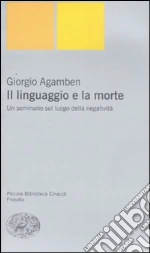 Title :
Il linguaggio e la morte. Un seminario sul luogo della negatività
Title :
Il linguaggio e la morte. Un seminario sul luogo della negativitàAuthor: Agamben Giorgio Publisher: Einaudi Un'indagine sulle strutture che costituiscono il fondamento della cultura occidentale. "Nella tradizione della filosofia occidentale, l'uomo appare come il mortale e, insieme, come il parlante. Egli è l'animale che ha la "facoltà" del linguaggio e l'animale che ha la "facoltà" della morte. Altrettanto essenziale è questo nesso nell'esperienza cristiana. La facoltà del linguaggio è la facoltà della morte: il nesso fra queste due "facoltà", sempre presupposte nell'uomo e, tuttavia, mai messe radicalmente in questione, può veramente restare impensato? E se l'uomo non fosse né il parlante, né il mortale, senza per questo cessare di morire e di parlare?" € 16,50
|
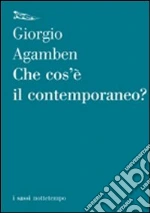 Title :
Che cos'è il contemporaneo?
Title :
Che cos'è il contemporaneo?Author: Agamben Giorgio Publisher: Nottetempo Che cosa significa essere contemporanei? Di chi e di che cosa siamo contemporanei? Agamben prova a rispondere a queste domande mettendo in tensione e quasi in corto circuito una serie di esperienze familiari: l'arcaico e il moderno, l'attuale e l'intempestivo, il tempo e la moda, il buio e la luce. Contemporaneo non è colui che cerca di coincidere e adeguarsi al suo tempo, ma chi aderisce a esso attraverso una sfasatura e un anacronismo; non chi vede le luci del suo tempo, ma chi riesce a percepirne l'oscurità. Finché, seguendo le spiegazioni che l'astrofisica moderna dà del buio del cielo notturno, l'autore disegna l'immagine di un nuovo angelo della storia: una luce che viaggia velocissima verso di noi senza mai poterci raggiungere. € 3,00
|
 Title :
Signatura rerum. Sul metodo
Title :
Signatura rerum. Sul metodoAuthor: Agamben Giorgio Publisher: Bollati Boringhieri «Il nono libro del trattato di Paracelso Sulla natura delle cose s'intitola De signatura rerum naturalium (Sulla segnatura delle cose naturali). L'idea che che tutte le cose portino un segno che manifesta e rivela le loro qualità invisibili è il nucleo originale dell'episteme paracelsiana. [...]In questo senso, se - come scrive Paracelso - "tutte le cose, erbe, semi, pietre, radici dischiudono nelle loro qualità, forme e figure ciò che è in esse", se "vengono tutte conosciute attraverso il loro signatum", allora "la signatura è la scienza attraverso cui tutto ciò che è nascosto viene trovato e senza quest'arte non si può fare nulla di profondo". Questa scienza è tuttavia, come ogni sapere, una conseguenza del peccato, perché Adamo nell'Eden era assolutamente "non-segnato" e tale sarebbe rimasto se non fosse "caduto nella natura", che non "lascia nulla non-segnato"». Così inizia questo libro di Agamben dedicato ai problemi del metodo e diviso in tre parti, corrispondenti ad altrettante riflessioni su tre aspetti specifici: a) il concetto di paradigma; b) la teoria delle segnature; c) la relazione fra storia e archeologia. Spunto per queste considerazioni è l'indagine sul metodo di uno studioso come Michel Foucault, sul quale Agamben dichiara di aver avuto occasione, negli ultimi anni, di apprendere molto. Così, accanto alla riflessione sul pensiero di Paracelso, il volume costituisce anche una nuova lettura del grande filosofo francese e della sua archeologia del sapere. € 16,00
Scontato: € 15,20
|
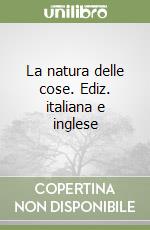 Title :
La natura delle cose. Ediz. italiana e inglese
Title :
La natura delle cose. Ediz. italiana e ingleseAuthor: Sieni Virgilio; Agamben Giorgio Publisher: Maschietto Editore € 12,00
|
||
|
2007 |
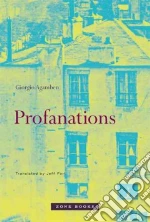 Title :
Profanations
Title :
ProfanationsAuthor: Agamben Giorgio, Fort Jeff (TRN) Publisher: Zone Books The Italian philosopher Giorgio Agamben has always been an original reader of texts, understanding their many rich and multiple historical, aesthetic, and political meanings and effects. In Profanations, Agamben has assembled for the first time some of his most pivotal essays on photography, the novel, and film. A meditation on memory and oblivion, on what is lost and what remains, Profanations proves yet again that Agamben is one of the most provocative writers of our time. In ten essays, Agamben ponders a series of literary and philosophical problems: the relation among genius, ego, and theories of subjectivity; the problem of messianic time as explicated in both images and lived experience; parody as a literary paradigm; and the potential of magic to provide an ethical canon. The range of topics and themes addressed here attest to the creativity of Agamben's singular mode of thought and his persistent concern with the act of witnessing, sometimes futile, sometimes earth-shattering: the talking cricket in Pinocchio; "helpers" in Kafka's novels; pictorial representations of the Last Judgment, of anonymous female faces, and of "Rosebud," the infamous object of obsession in Citizen Kane. "In Praise of Profanity," the central essay of this small but dense book, confronts the question of profanity as the crucial political task of the moment. An act of resistance to every form of separation, the concept of profanation reorients perceptions of how power, consumption, and use interweave to produce an urgent political modality and desire: to profane the unprofanable. Agamben not only provides a new and potent theoretical model but describes it with a writerly style that itself forges inescapable links among literature, politics, and philosophy.Giorgio Agamben is Professor of Aesthetics at the University of Venice. His many publications include Homo Sacer: Sovereign Power and Bare Life, Remnants of Auschwitz: The Witness and the Archive (Zone Books), The Coming Community, and State of Exception. € 24,10
|
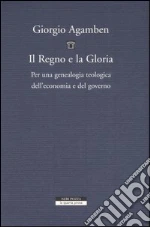 Title :
Il regno e la gloria. Per una genealogia teologica dell'economia e del governo. Homo sacer. Vol. II/2
Title :
Il regno e la gloria. Per una genealogia teologica dell'economia e del governo. Homo sacer. Vol. II/2Author: Agamben Giorgio Publisher: Neri Pozza Due domande scandiscono il campo della ricerca in questo libro: perché il potere ha assunto in occidente la forma di un'"economia", cioè di un governo degli uomini e delle cose? Perché, se il potere è essenzialmente governo, esso ha bisogno della gloria, cioè di tutto quell'apparato cerimoniale e liturgico che l'accompagna fin dall'inizio? Cercando di rispondere, sulle tracce di Michel Foucault, alla prima domanda, Agamben scopre che, nei primi secoli della storia della chiesa, per conciliare il monoteismo con le tre persone, la dottrina della Trinità viene introdotta nella forma di una "economia " della vita divina, come un problema di gestione e di governo della "casa" celeste e del mondo. Agamben mostra che, fondendosi con l'idea di provvidenza, questo paradigma "teologico-economico " è inaspettatamente all'origine di molte delle categorie fondamentali della politica moderna, dalla teoria democratica della divisione dei poteri fino alla dottrina strategica degli "effetti collaterali ", dalla "mano invisibile" del liberalismo smithiano fino alle idee di ordine e sicurezza. Ma la novità forse più grande che emerge dalla ricerca è che il potere moderno non è soltanto "governo", ma anche "gloria" e che gli aspetti cerimoniali, liturgici e acclamatori che siamo abituati a considerare come un residuo del passato costituiscono invece tuttora la base del potere occidentale. € 32,00
|
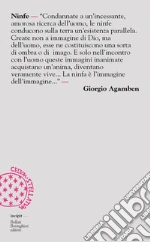 Title :
Ninfe
Title :
NinfeAuthor: Agamben Giorgio Publisher: Bollati Boringhieri «In Paracelso, la ninfa si presenta come una creatura in carne e ossa, creata a immagine dell'uomo, che può acquistare un anima solo unendosi con lui. La congiunzione amorosa con l'immagine, simbolo della conoscenza perfetta, diventa in Boccaccio l'impossibile unione sessuale con una imago trasformata in creatura che "beve e mangia"...» Così, il filosofo Giorgio Agamben si avventura nell'indagine sulla natura misteriosa e doppia delle Ninfe, mettendo in campo riflessioni sulla letteratura, la filosofia, la mitologia, la storia dell'arte e l'antropologia. Rifacendosi alla lezione di Aby Warhurg che, utilizzando tutte queste "piste indiziarie", seppe dare una nuova e feconda lettura del mondo delle immagini, Agamben torna a lavorare sui materiali di "Stanze", ragionando su queste figure che paiono essere una delle chiavi più ricche per penetrare la mitologia degli antichi e anche certe costanti della nostra storia psicologica rispetto al rapporto tra Anima e Sessualità. € 12,00
Scontato: € 11,40
|
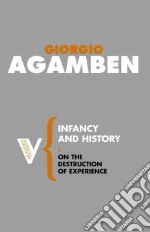 Title :
Infancy and History
Title :
Infancy and HistoryAuthor: Giorgio Agamben Publisher: Verso How andwhy did experience and knowledge become separated? Is it possible totalk of an infancy of experience, a "dumb" experience? For WalterBenjamin, the "poverty of experience" was a characteristic ofmodernity, originating in the catastrophe of the First World War. ForGiorgio Agamben, the Italian editor of Benjamin's complete works, thedestruction of experience no longer needs catastrophes: daily life inany modern city will suffice. Agamben'sprofound and radical exploration of language, infancy, and everydaylife traces concepts of experience through Kant, Hegel, Husserl andBenveniste. In doing so he elaborates a theory of infancy that throwsnew light on a number of major themes in contemporary thought: theanthropological opposition between nature and culture; the linguisticopposition between speech and language; the birth of the subject andthe appearance of the unconscious. Agamben goes on to consider time andhistory; the Marxist notion of base and superstructure (via a carefulreading of the famous Adorno-Benjamin correspondence on Baudelaire'sParis); and the difference between rituals and games. Beautifullywritten, erudite and provocative, these essays will be of greatinterest to students of philosophy, linguistics, anthropology andpolitics. € 15,50
|
||
|
2006 |
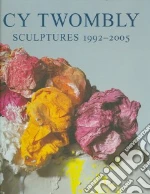 Title :
Cy Twombly
Title :
Cy TwomblyAuthor: Agamben Giorgio, Albee Edward, Baumstark Reinhold, Schulz-Hoffmann Carla, Littkemann Jochen (PHT) Publisher: Prestel Pub € 66,20
|
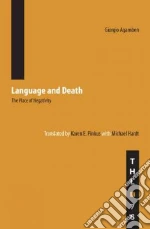 Title :
Language And Death
Title :
Language And DeathAuthor: Agamben Giorgio, Pinkus Karen E. (TRN), Hardt Michael (TRN) Publisher: Univ of Minnesota Pr A formidable and influential work, Language and Death sheds a highly original light on issues central to Continental philosophy, literary theory, deconstruction, hermeneutics, and speech-act theory. Focusing especially on the incompatible philosophical systems of Hegel and Heidegger within the space of negativity, Giorgio Agamben offers a rigorous reading of numerous philosophical and poetic works to examine how these issues have been traditionally explored. Agamben argues that the human being is not just ?speaking” and ?mortal” but irreducibly ?social” and ?ethical.” Giorgio Agamben teaches philosophy at the Collège International de Philosophie in Paris and at the University of Macerata in Italy. He is the author of Means without End (2000), Stanzas (1993), and The Coming Community (1993), all published by the University of Minnesota Press. Karen E. Pinkus is professor of French and Italian at the University of Southern California. Michael Hardt is professor of literature and romance studies at Duke University. € 21,30
|
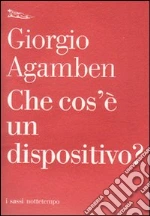 Title :
Che cos'è un dispositivo?
Title :
Che cos'è un dispositivo?Author: Agamben Giorgio Publisher: Nottetempo Il mondo in cui viviamo si presenta come una grande proliferazione e accumulazione di dspositivi, al punto che non vi è oggi un solo istante della vita degli individui che non sia modellato, controllato o contaminato da un qualche dispositivo. Alla radice di ogni dispositivo - dal cellulare alla televisione, dal PC all'automobile - sta, infatti, un desiderio di felicità e la cattura di questo desiderio costituisce la potenza specifica del dispositivo. € 4,00
Scontato: € 3,80
|
|
2005 |
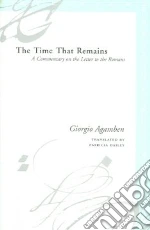 Title :
The Time That Remains
Title :
The Time That RemainsAuthor: Agamben Giorgio Publisher: Stanford Univ Pr In The Time That Remains, Agamben seeks to separate the Pauline texts from the history of the Church that canonized them, thus revealing them to be ?the fundamental messianic texts of the West.” He argues that Paul's letters are concerned not with the foundation of a new religion but rather with the ?messianic” abolition of Jewish law. Situating Paul's texts in the context of early Jewish messianism, this book is part of a growing set of recent critiques devoted to the period when Judaism and Christianity were not yet fully distinct, placing Paul in the context of what has been called ?Judaeo-Christianity.” Agamben's philosophical exploration of the problem of messianism leads to the other major figure discussed in this book, Walter Benjamin. Advancing a claim without precedent in the vast literature on Benjamin, Agamben argues that Benjamin's philosophy of history constitutes a repetition and appropriation of Paul's concept of ?remaining time.” Through a close reading and comparison of Benjamin's ?Theses on the Philosophy of History” and the Pauline Epistles, Agamben discerns a number of striking and unrecognized parallels between the two works. € 22,40
|
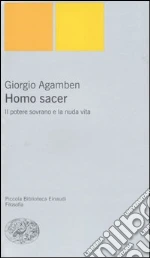 Title :
Il potere sovrano e la nuda vita. Homo sacer
Title :
Il potere sovrano e la nuda vita. Homo sacerAuthor: Agamben Giorgio Publisher: Einaudi Seguendo un percorso che da Aristotele e il mondo classico giunge sino a tempi recenti con Hanna Arendt e Michel Foucault, Agamben analizza il concetto di vita e di sacro, proponendone l'applicazione in ambito politico dove, a partire dall'età moderna "la vita naturale comincia a essere inclusa nei meccanismi e nei calcoli del potere statuale e la politica si trasforma in bio-politica". Protagonista del libro è la nuda vita dell'homo sacer. Soltanto superando una dimensione politica che non conosce altro valore che la vita, sarà possibile alle democrazie moderne andare oltre le tragiche tentazioni di nazismo, fascismo e, in generale, dei regimi totalitari. La prima edizione in "Einaudi contemporanea", 1998. € 19,00
Scontato: € 18,05
|
 Title :
The Time That Remains
Title :
The Time That RemainsAuthor: Agamben Giorgio Publisher: Stanford Univ Pr In The Time That Remains, Agamben seeks to separate the Pauline texts from the history of the Church that canonized them, thus revealing them to be “the fundamental messianic texts of the West.” He argues that Paul’s letters are concerned not with the foundation of a new religion but rather with the “messianic” abolition of Jewish law. Situating Paul’s texts in the context of early Jewish messianism, this book is part of a growing set of recent critiques devoted to the period when Judaism and Christianity were not yet fully distinct, placing Paul in the context of what has been called “Judaeo-Christianity.” Agamben’s philosophical exploration of the problem of messianism leads to the other major figure discussed in this book, Walter Benjamin. Advancing a claim without precedent in the vast literature on Benjamin, Agamben argues that Benjamin’s philosophy of history constitutes a repetition and appropriation of Paul’s concept of “remaining time.” Through a close reading and comparison of Benjamin’s “Theses on the Philosophy of History” and the Pauline Epistles, Agamben discerns a number of striking and unrecognized parallels between the two works. € 52,30
|
|
2004 |
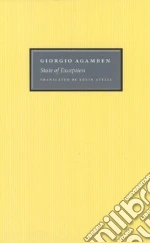 Title :
State of Exception
Title :
State of ExceptionAuthor: Agamben Giorgio, Attell Kevin (TRN) Publisher: Univ of Chicago Pr Two months after the attacks of 9/11, the Bush administration, in the midst of what it perceived to be a state of emergency, authorized the indefinite detention of noncitizens suspected of terrorist activities and their subsequent trials by a military commission. Here, distinguished Italian philosopher Giorgio Agamben uses such circumstances to argue that this unusual extension of power, or "state of exception," has historically been an underexamined and powerful strategy that has the potential to transform democracies into totalitarian states. The sequel to Agamben's Homo Sacer: Sovereign Power and Bare Life, State of Exception is the first book to theorize the state of exception in historical and philosophical context. In Agamben's view, the majority of legal scholars and policymakers in Europe as well as the United States have wrongly rejected the necessity of such a theory, claiming instead that the state of exception is a pragmatic question. Agamben argues here that the state of exception, which was meant to be a provisional measure, became in the course of the twentieth century a normal paradigm of government. Writing nothing less than the history of the state of exception in its various national contexts throughout Western Europe and the United States, Agamben uses the work of Carl Schmitt as a foil for his reflections as well as that of Derrida, Heidegger, Deleuze, Benjamin, and Arendt. In this highly topical book, Agamben ultimately arrives at original ideas about the future of democracy and casts a new light on the hidden relationship that ties law to violence. € 21,30
|
|
|
2003 |
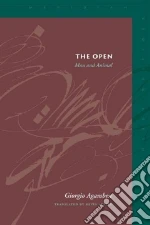 Title :
The Open
Title :
The OpenAuthor: Agamben Giorgio, Attell Kevin (TRN) Publisher: Stanford Univ Pr The end of human history is an event that has been foreseen or announced by both messianics and dialecticians. But who is the protagonist of that history that is coming?or has come?to a close? What is man? How did he come on the scene? And how has he maintained his privileged place as the master of, or first among, the animals? In The Open, contemporary Italian philosopher Giorgio Agamben considers the ways in which the ?human” has been thought of as either a distinct and superior type of animal, or a kind of being that is essentially different from animal altogether. In an argument that ranges from ancient Greek, Christian, and Jewish texts to twentieth-century thinkers such as Heidegger, Benjamin, and Kojève, Agamben examines the ways in which the distinction between man and animal has been manufactured by the logical presuppositions of Western thought, and he investigates the profound implications that the man/animal distinction has had for disciplines as seemingly disparate as philosophy, law, anthropology, medicine, and politics. € 20,60
|
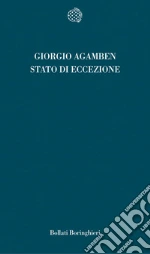 Title :
Lo stato di eccezione. Homo sacer. Vol. II/1
Title :
Lo stato di eccezione. Homo sacer. Vol. II/1Author: Agamben Giorgio Publisher: Bollati Boringhieri Lo stato di eccezione, ossia quella sospensione dell'ordine giuridico che siamo abituati a considerare una misura provvisoria e straordinaria, sta oggi diventando sotto i nostri occhi un paradigma normale di governo, che determina in misura crescente la politica sia estera sia interna degli stati. Il libro di Agamben è il primo tentativo di fornirne una sommaria ricostruzione storica e, insieme, di analizzare le ragioni e il senso della sua evoluzione attuale, da Hitler a Guantanamo. Quando lo stato di eccezione tende a confondersi con la regola, le istituzioni e gli equilibri delle costituzioni democratiche non possono più funzionare e lo stesso confine fra democrazia e assolutismo sembra cancellarsi. Muovendosi nella terra di nessuno fra la politica e il diritto, fra l'ordine giuridico e la vita, dove i ricercatori non amano avventurarsi, Agamben smonta a una a una le teorizzazioni giuridiche dello stato di eccezione e getta una luce nuova sulla relazione nascosta che lega violenza e diritto. € 16,00
Scontato: € 15,20
|
|
2002 |
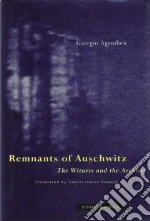 Title :
Remnants of Auschwitz
Title :
Remnants of AuschwitzAuthor: Agamben Giorgio Publisher: Zone Books In this book the Italian philosopher Giorgio Agamben looks closely at the literature of the survivors of Auschwitz, probing the philosophical and ethical questions raised by their testimony. "In its form, this book is a kind of perpetual commentary on testimony. It did not seem possible to proceed otherwise. At a certain point, it became clear that testimony contained at its core an essential lacuna; in other words, the survivors bore witness to something it is impossible to bear witness to. As a consequence, commenting on survivors' testimony necessarily meant interrogating this lacuna or, more precisely, attempting to listen to it. Listening to something absent did not prove fruitless work for this author. Above all, it made it necessary to clear away almost all the doctrines that, since Auschwitz, have been advanced in the name of ethics." —Giorgio Agamben € 19,60
|
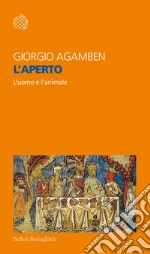 Title :
L'aperto. L'uomo e l'animale
Title :
L'aperto. L'uomo e l'animaleAuthor: Agamben Giorgio Publisher: Bollati Boringhieri «Il conflitto politico decisivo, che governa ogni altro conflitto è, nella nostra cultura, quello fra l'animalità e l'umanità dell'uomo», così che «chiedersi in che modo - nell'uomo - l'uomo è stato separato dal nonuomo e l'animale dall'umano, è più urgente che prendere posizione sulle grandi questioni, sui cosiddetti valori e diritti umani». Un'urgenza che è sempre apparsa tale, almeno da quando la metafisica aristotelica definì il principio del vivente, ma che si manifesta con una crucialità nuova, indifferibile, proprio oggi, nel momento in cui è necessario mettere fuori gioco la potente «macchina antropologica» che nella tradizione occidentale ha articolato per secoli, con diversi dispositivi congiuntivi, il corpo e l'anima, la vita animale e il logos, il naturale e il soprannaturale, la tenebra e la luce. Sulla scorta di Heidegger, Agamben continua, da un altro punto di vista, la riflessione condotta nei libri precedenti intorno al concetto di vita, e si interroga sulla soglia critica che produce l'umano, che distingue e insieme approssima umanità e animalità dell'uomo, decidendo «ogni volta e in ogni individuo dell'umano e dell'animale, della natura e della storia, della vita e della morte». € 14,00
Scontato: € 13,30
|
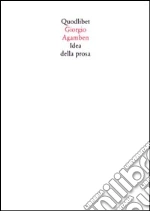 Title :
Idea della prosa
Title :
Idea della prosaAuthor: Agamben Giorgio Publisher: Quodlibet "Un bel viso è forse il solo luogo in cui vi sia veramente silenzio. Mentre il carattere segna il volto di parole non dette e di intenzioni rimaste incompiute, mentre la faccia dell'animale sembra sempre sul punto di proferire parole, la bellezza umana apre il viso al silenzio. Ma il silenzio - che qui avviene - non è semplicemente sospensione del discorso, ma silenzio della parola stessa, il diventar visibile della parola: idea del linguaggio. Per questo nel silenzio del viso è veramente a casa l'uomo". Trentatrè piccoli trattati di filosofia con undici immagini dialettiche. € 15,00
|
|
2001 |
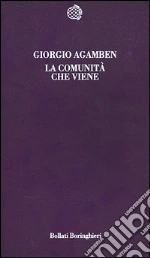 Title :
La comunità che viene
Title :
La comunità che vieneAuthor: Agamben Giorgio Publisher: Bollati Boringhieri "L'essere che viene: né individuale né universale, ma qualunque. Singolare, ma senza identità. Definito, ma solo nello spazio vuoto dell'esempio. E, tuttavia, non generico né indifferente". Così veniva presentata nel 1990 la prima edizione di questo libro. Nella "Postilla 2001" aggiunta a questa edizione, l'autore non può che constatare che ciò che all'inizio era solo un'ipotesi - l'assenza d'opera, la singolarità qualunque, il "bloom" - è diventato realtà. € 12,00
|
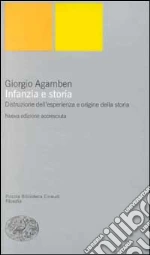 Title :
Infanzia e storia. Distruzione dell'esperienza e origine della storia
Title :
Infanzia e storia. Distruzione dell'esperienza e origine della storiaAuthor: Agamben Giorgio Publisher: Einaudi € 17,00
Scontato: € 16,15
|
|
2000 |
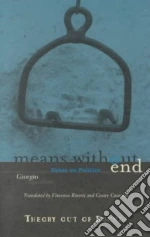 Title :
Means Without End
Title :
Means Without EndAuthor: Agamben Giorgio, Binetti Vincenzo (TRN), Casarino Cesare (TRN) Publisher: Univ of Minnesota Pr € 21,30
|
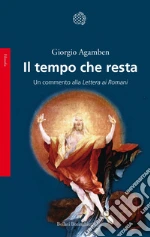 Title :
Il tempo che resta. Un commento alla «Lettera ai Romani»
Title :
Il tempo che resta. Un commento alla «Lettera ai Romani»Author: Agamben Giorgio Publisher: Bollati Boringhieri Se è vero che ogni opera del passato giunge alla piena leggibilità solo in determinati momenti della sua storia, per le Lettere di Paolo l'ora sembra venuta. A uno dei testi più commentati della tradizione occidentale Agamben restituisce quel rango messianico che solo può riorientare la prospettiva di una interpretazione ormai bimillenaria. Paolo non fonda una religio dell'universale, non annuncia una nuova identità e una nuova vocazione, ma revoca ogni identità e ogni vocazione; non abolisce la Legge, ma la dispone a un uso che si colloca al di là di ogni diritto. Cuore del messianismo - dall'evangelo paolino fino alle tesi Sul concetto della storia di Benjamin, che talora ne nascondono gli splendidi calchi - è una esperienza del tempo affidata all'inversione del rapporto tra passato e futuro, tra memoria e speranza. Come tempo di ora, segmento di tempo profano teso fra la resurrezione di Gesù e l'eschaton apocalittico, il tempo messianico si costituisce in figura stessa del tempo presente, di ogni presente. Sul canone di «ricapitolazione vertiginosa» che appartiene al messianico è modellato anche l'andamento del libro di Agamben: una sapienza esegetica da biblista si trasfonde nelle illuminazioni del filosofo che interroga Paolo a partire da Schmitt, Kafka e Scholem, e che sa cogliere nella parola paolina, attraverso Lutero, le ascendenze concettuali della dialettica hegeliana. € 24,00
Scontato: € 22,80
|
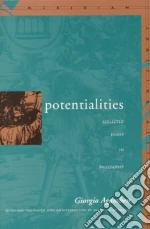 Title :
Potentialities
Title :
PotentialitiesAuthor: Agamben Giorgio, Heller-Roazen Daniel Publisher: Stanford Univ Pr This book collects fifteen major philosophical essays written over a period of more than twenty years by acclaimed Italian philosopher Giorgio Agamben. The volume opens with an introduction in which the editor situates Agamben's work with respect to both the history of philosophy and contemporary European thought. The essays that follow articulate a series of theoretical confrontations with privileged figures in the history of philosophy, politics, and criticism, from Plato to Spinoza, Aristotle to Deleuze, Carl Schmitt to Benjamin, Hegel to Aby Warburg, and Heidegger to Derrida. Three fundamental concepts organize the collection as a whole: language, in the sense not of particular statements but rather the very taking place of speech, the pure fact of language's existence; history, as it appears from a perspective in which tradition, transmission, and memory reach their messianic fulfillment; and potentiality, understood as a fundamental problem of metaphysics, ethics, and the philosophy of language. All these topics converge in the final part of the book, in which Agamben offers an extensive reading of Melville's short story "Bartleby the Scrivener" as a work that puts potentiality and actuality, possibility and reality, in an altogether new light. € 29,90
|
|
1999 |
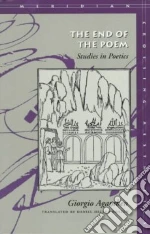 Title :
The End of the Poem
Title :
The End of the PoemAuthor: Agamben Giorgio, Heller-Roazen Daniel (TRN) Publisher: Stanford Univ Pr This book, by one of Italy's most important and original contemporary philosophers, represents a broad, general, and ambitious undertaking?nothing less than an attempt to rethink the nature of poetic language and to rearticulate relationships among theology, poetry, and philosophy in a tradition of literature initiated by Dante. The author presents ?literature” as a set of formal or linguistic genres that discuss or develop theological issues at a certain distance from the discourse of theology. This distance begins to appear in Virgil and Ovid, but it becomes decisive in Dante and in his decision to write in the vernacular. His vernacular Italian reaches back through classical allusion to the Latin that was in his day the language of theology, but it does so with a difference. It is no accident that in the Commedia Virgil is Dante's guide. The book opens with a discussion of just how Dante's poem is a ?comedy,” and it concludes with a discussion of the ?ends of poetry” in a variety of senses: enjambment at the ends of lines, the concluding lines of poems, and the end of poetry as a mode of writing this sort of literature. Of course, to have poetry ?end” does not mean that people stop writing it, but that literature passes into a period in which it is concerned with its own ending, with its own bounds and limits, historical and otherwise. Though most of the essays make specific reference to various authors of the Italian literary tradition (including Dante, Polifilo, Pascoli, Delfini, and Caproni), they transcend the confines of Italian literature and engage several other literary and philosophical authors (Plato, Aristotle, the Stoics, Boethius, the Provençal poets, Mallarmé, and Hölderlin, among others). € 20,60
|
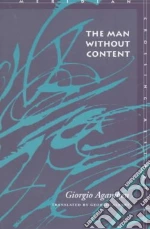 Title :
The Man Without Content
Title :
The Man Without ContentAuthor: Agamben Giorgio, Albert Georgia (TRN) Publisher: Stanford Univ Pr In this book, one of Italy's most important and original contemporary philosophers considers the status of art in the modern era. He takes seriously Hegel's claim that art has exhausted its spiritual vocation, that it is no longer through art that Spirit principally comes to knowledge of itself. He argues, however, that Hegel by no means proclaimed the ?death of art” (as many still imagine) but proclaimed rather the indefinite continuation of art in what Hegel called a ?self-annulling” mode. With astonishing breadth and originality, the author probes the meaning, aesthetics, and historical consequences of that self-annulment. In essence, he argues that the birth of modern aesthetics is the result of a series of schisms?between artist and spectator, genius and taste, and form and matter, for example?that are manifestations of the deeper, self-negating yet self-perpetuating movement of irony. Through this concept of self-annulment, the author offers an imaginative reinterpretation of the history of aesthetic theory from Kant to Heidegger, and he opens up original perspectives on such phenomena as the rise of the modern museum, the link between art and terror, the natural affinity between ?good taste” and its perversion, and kitsch as the inevitable destiny of art in the modern era. The final chapter offers a dazzling interpretation of Dürer's Melancholia in the terms that the book has articulated as its own. The Man Without Content will naturally interest those who already prize Agamben's work, but it will also make his name relevant to a whole new audience?those involved with art, art history, the history of aesthetics, and popular culture. € 20,60
|

|

|

|

|